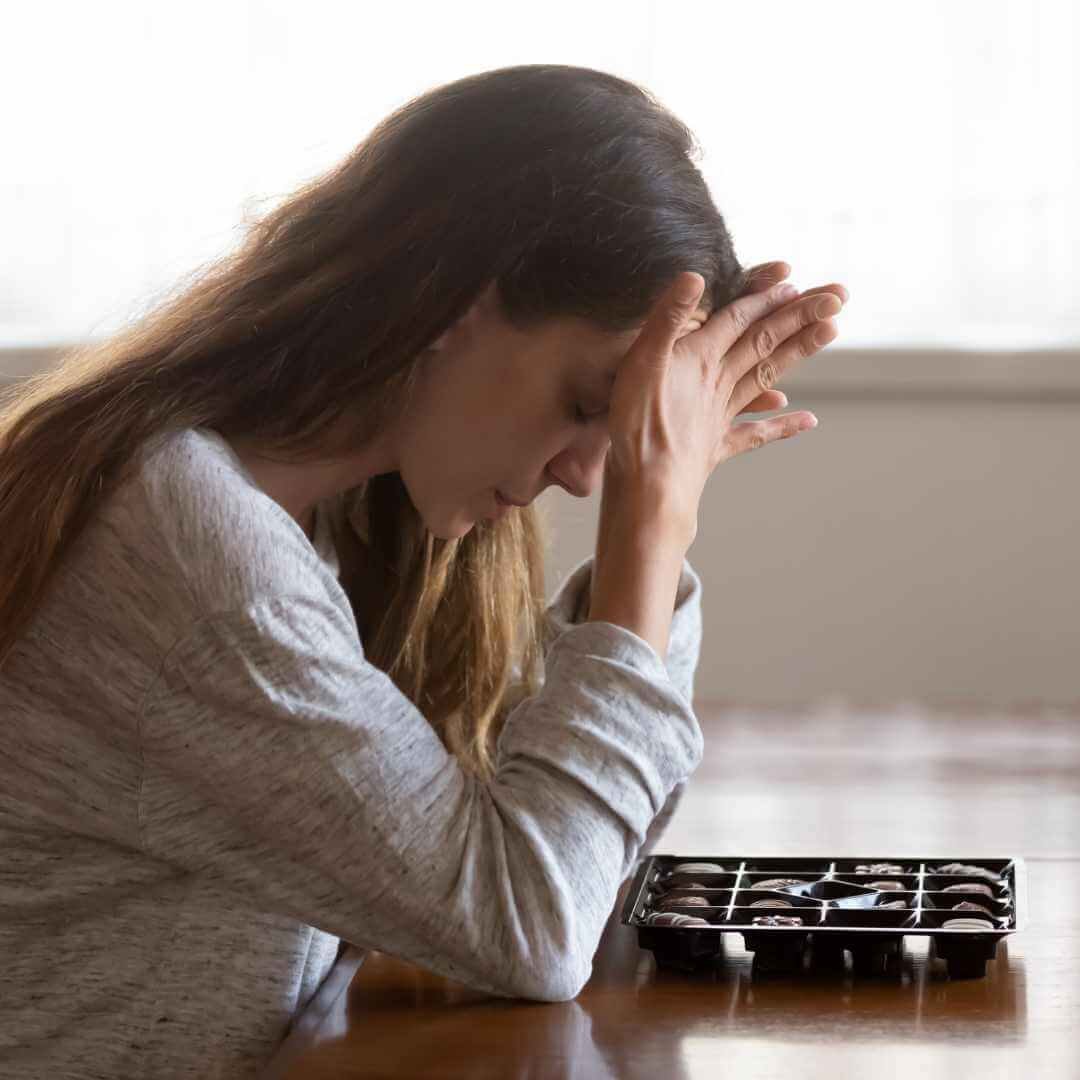The holidays are a special time of year for so many people. Spending time with family, eating delicious foods, and doing holiday activities that you only experience this time of year. For some people, the holidays are a hellscape. When you are dealing with an eating disorder or eating disorder symptoms, it can feel overwhelming to spend time around people and food when you are uncomfortable in your body and have a difficult relationship with food. People with eating disorders often feel guilty because they want to be able to relax and enjoy themselves and enjoy the most magical time of year but they’re stressed out.
If you have an eating disorder and you dread the holidays, I get that it’s difficult for you, and you wish you didn’t feel this way but you do. First, I want you to honor and respect what you feel. You don’t need to try not to feel that way. Use self-compassion and be gentle with yourself. Perhaps you and I can just make a game plan for how to prepare for the holidays instead? Let’s do it
Eating Disorder Coping Skills for the holidays
There are numerous ways to manage and cope that will be effective and helpful to you. The ones that I have listed may not be all that you need, and that’s ok. There are more options than just these to help you get through the holidays. These are a few to consider trying.
Accept the holidays are challenging
As I said before, you don’t need to try and convince yourself to love the holidays. Pretending you are fine is just another attempt of shoving emotions down that will bubble right back up later. Having an eating disorder during the holidays is difficult. There’s both food and people you are uncomfortable with, and that’s understandable. Accepting that the holidays are challenging doesn’t mean there’s a need to feel more anxious and work yourself up further about it. The holidays might mean more anxiety, and it also might mean that you feel eating disorder triggers. It’s expected that this time of year will be harder for you.
Create a Plan
There’s no need to bust out the spreadsheets or create a PowerPoint. I know you may be tempted but we don’t need that robust of a plan. You still need to allow flexibility in your life and recognize you don’t have all the control over the outcomes. The type of plan to focus on is focusing on the big picture. What type of coping skills do you think you’ll need during this time of year? Think about giving yourself space to use coping skills to prepare for events that are centered around food and people and consider what self-care you will use after to recover. Consider how you will cope with anxiousness when it arises. Be careful that you aren’t using more eating disorder behaviors to compensate for food you’ve eaten or will eat.
Recognize your triggers
Knowing beforehand what your triggers might be are important. You can’t anticipate everything that will be triggering, and that’s not what we are trying to do. I’m sure you have a good idea of potential pitfalls for yourself might. If you know Aunt Jan is going to complain about her weight or say how bad she is for eating the fudge, let’s anticipate that might be triggering. Remember that people in your life will not understand eating disorders even though you desperately want them to. You will have family members using disordered eating behaviors and they probably still won’t get it. It’s unbelievably frustrating and triggering. Consider how you’ll take care of yourself and cope when triggers arise.
Use your voice
You do not have to suck it up and pretend you're ok. It’s ok to politely ask Aunt Jan to change the conversation. It’s ok to use your voice and tell people you are uncomfortable with the conversations about dieting and weight in the new year. They might not understand, and you might feel guilty making a request but that doesn't mean you shouldn’t do it. Sometimes anxiety can grow stronger when you don’t speak up and share that something is bothering you. It’s not an unreasonable thing to ask to change the topic when you are uncomfortable even if it’s not about eating, food, or body image. Advocate for yourself. Your thoughts and opinion matter.
Reach Out to Supports
This time of year is one of the most important times to utilize the people in your life that are safe. Identify the people you are comfortable with being open about how you feel. Arrange beforehand to check in with them about how you are doing and feeling during the holidays. You don’t have to try and do this on your own. Do whatever works for you as far as contact with supportive people. Sending a text when you are struggling and need to talk about how you feel can take the edge off during a difficult time of year. You don’t have to do this all yourself. People care about you and want to help.
Resources for trying to navigate eating disorder recovery during the holidays
Your eating disorder recovery matters and needs to be prioritized regardless of the holidays. The National Eating Disorder Association provides a holiday round-up of resources to help you navigate your eating disorder recovery. These resources can not only help you utilize coping skills and manage your triggers but can also help your family members and friends know how to support you.
Eating disorder therapy in Utah is a good option
Therapy can do wonders for you when you are in the midst of an eating disorder or disordered eating. You don’t have to keep feeling overwhelmed by food. You can stop the binge and restrict the cycle. You don’t have to keep putting off therapy because you don’t think it’s “that bad” or “other people have it worse.” You deserve to get help before your eating disorder gets any worse. You are not wasting time by going to therapy. Therapy can help you develop the skills necessary to deal with triggers and to be able to manage your anxiety better. You can stop hating your body so badly. I love being an eating disorder therapist because I get to help you address all of the areas of your life that might be impacted by your eating disorder. I promise eating disorder therapy can help if you are ready and willing to do whatever it takes to heal. Don’t know what to talk about? I promise there are plenty of topics to address in eating disorder therapy.
Start working with an eating disorder therapist in Utah
You don’t have to keep feeling stuck with your relationship with food. You can stop hating yourself and get off the hamster wheel of repeating the same cycles over and over again. Eating disorder therapy can help. This Utah Counseling Center has an eating disorder therapist specializing in eating disorder therapy. To begin counseling follow the steps below:
Meet with a therapist for eating disorders
Begin eating disorder recovery
Online Eating Disorder Therapy in Utah
I know how hard it is to be able to find an experienced therapist in your town that knows how to treat eating disorders. There are so many parts of Utah that don’t have access to this. This is why I offer online therapy in Utah. You don’t have to travel to your therapy appointments but can join your therapy session from the comfort of your home through video chat. It’s just as effective as in-person therapy. My clients love online eating disorder therapy, and I believe you will too.
Online therapy means I work with clients in Logan, Salt Lake City, Cedar City, St. George, Provo, Heber City, and more!
Other mental health services provided by Maple Canyon Therapy
Eating disorder therapy isn’t the only mental health service offered at this Utah Counseling Practice. Other mental health services provided by Maple Canyon Therapy include binge eating disorder treatment, EMDR therapy, anxiety therapy, body image therapy, counseling for college students, and therapy for birth trauma. Schedule a free phone consultation to see how I can help.
About the Author
Ashlee Hunt is a licensed clinical social worker and eating disorder therapist at Maple Canyon Therapy in Utah. Ashlee has a master's degree in social work from Utah State University as well as two bachelor's degrees, one in psychology and one in family life and human development from Southern Utah University. She has been treating eating disorders since 2013 and loves working with women who are desperate for eating disorder recovery. in treating eating disorders, Ashlee likes to use EMDR to address underlying negative beliefs about themselves as well as help women heal from past experiences. When Ashlee is in the therapy room, she enjoys spending time exploring the red hills in St. George, Utah on her e-bike.

















































